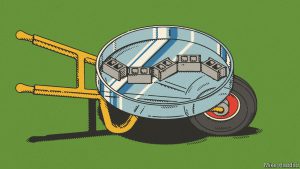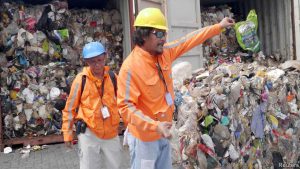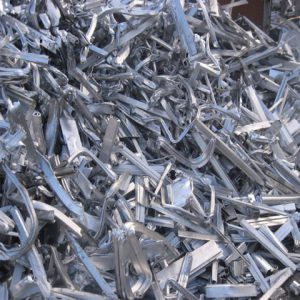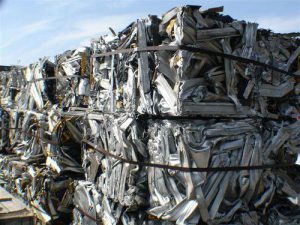By Mark Saunokonoko • Senior Journalist
12:45pm May 15, 2018
China’s recent decision to restrict foreign waste imports has pushed Australians into a challenging and potentially environmentally destructive recycling future.
Beijing’s shift has had a huge impact in Australia, suddenly halting the annual export of 1.3 million tonnes of recycled waste to China. This figure accounts for 29 per cent of all paper and 36 per cent of all plastics collected from yellow bins which Australians roll to the kerb for their local council to collect.
To manage the escalating crisis, local councils, such as Ipswich in Queensland, have resorted to dumping recyclable plastic and paper into landfill, in the face of dwindling options and already stretched budgets.
Federal Energy and Environment Minister Josh Frydenberg has said incinerating plastic and paper, the most brutal of all waste-to-energy processes, may be necessary in the short-term.
Landfilling and burning recyclable waste are worrying scenarios for Australia, cautioned a sustainability expert who spoke with nine.com.au.
“As a short-term solution incineration is better than landfill,” Jenni Downes, a researcher at University of Technology Sydney’s Institute for Sustainable Futures, said.
“But the problem is that it is not really a short-term solution. It often becomes a long-term solution, and then it locks out investment or incentives to do better things with recycling.”
Ms Downes said Australia’s current recycling infrastructure will require “large expansion” if it is to manage the mountainous tonnage of waste once taken care of by China.
Last month, environment ministers from all states met in Melbourne with Mr Frydenberg to discuss how China’s import restrictions have redefined all elements of Australia’s recycling model.
At the conclusion of that meeting, where environmentally unfriendly incineration was not ruled out, ministers outlined a series of broad ambitions to reduce waste.
Ministers also agreed a target of 100 per cent of Australian packaging being recyclable or reusable by 2025.
But the peak business body for Australia’s recycling industry criticised the meeting’s apparent lack of detail and comprehensive targets.
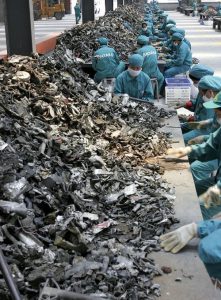
Chinese workers sellect car part scrap to collect aluminum for recycling at a smelting plant in the outskirts of Shanghai. (AAP)
“The right chords have been struck … about investing in recycling’s future, but we did not hear two very important sounds, implementation details and dollars in the till,” Pete Shmigel, Australian Council of Recycling boss, said in a statement.
Mr Shmigel added “investment is now to be expected”.
Yet the building of a robust and future-proofed recycling industry in Australia will take more than just multi-million-dollar federal investment, UTS researcher Ms Downes said.
Recycling plants will need to be built across Australia’s vast geography, but that infrastructure needs underpinning by a domestic market that can take the recycled material and turn it into saleable products.
Ms Downes said Australia’s current recycling facilities are only capable of producing cloudy plastic bottles – not the clear variety that customers want.
It was up to the federal government, with its vast procurement power, to build the demand for domestic recycled products that will allow the industry to grow and thrive, she said.
For instance, recycled glass can be crushed into sand and used in road construction instead of purchasing sand from overseas.
Government department offices should use Australian recycled paper and be stocked with furniture made from recycled plastic, Ms Downes added.
“Those initiatives will be hard to begin with because it will be more expensive,” Ms Downes said.
“Stimulating the market will be about incentivising people to pay higher costs for goods or subsidising companies producing goods from recycled material.”
The future for Australian households is likely to involve incentives – and potentially punishments – to change yellow recycling bin behaviours.
Residents could face imminent rate hikes, while last month an under-pressure local council in Queensland briefly threatened to scrap its recycling program altogether.
A resolution was reached, but Ipswich City Council said residents who repeatedly contaminate their yellow bins could have them removed – and won’t get them back unless they pay a $75 fee.
The bin-tagging program would see cameras installed in garbage trucks to monitor contamination levels, according to the council.
Further discussions between Mr Frydenberg and state environment ministers are scheduled for next month.
